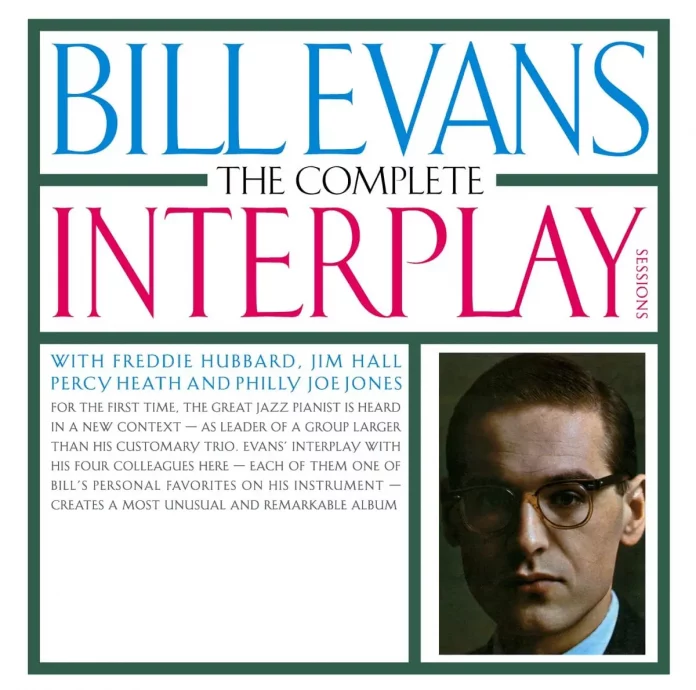In 1962 Bill Evans, still recovering from the death of his bassist Scott LaFaro a year earlier, and desperately in need of money to finance his “habit”, asked Riverside boss Orrin Keepnews (who needed little persuasion) to let him make a studio session with the young bop trumpeter Freddie Hubbard (but only because his first choice, Art Farmer, was unavailable), together with Jim Hall, Percy Heath and Philly Joe Jones.
These quintet sessions (unusual for Evans) were largely successful. Despite not knowing such standards as You And The Night And The Music, I’ll Never Smile Again and Wrap Your Troubles In Dreams, Hubbard quickly learned them in the studio. Possibly because of this unfamiliarity, he plays in a more restrained fashion, rarely employed with Art Blakey’s Jazz Messengers. On You And The Night his solo is inventive and under control, and also on both takes of I’ll Never Smile Again his muted trumpet is poised and pleasing.
On all the original Interplay tracks Philly Joe and Jim Hall provide sympathetic and swinging support, while Evans demonstrates that he could readily fashion heady and blues-inflected solos. In his Downbeat review Don DeMicheal judged that despite the excellent performances of his accompanists, it was Evans who was the star. On You And The Night, with Heath and Jones prompting him to even greater heights, “he breaks stunningly into his solo, and then builds a climbing, tightly wound series of choruses, cleanly articulated so that each phrase shines like a jewel”.
On the sessions recorded a month later, Hubbard was replaced by Zoot Sims, and Ron Carter replaced Heath. By all accounts, there were problems from the outset. Consisting entirely of original material, the songs were under rehearsed, and the performances were hybrids of balladry and bop. My Bells needed 25 takes, and Zoot was unusually tentative in his early solos. But things settled down, and the gentle Loose Bloose has a delicate solo from Hall and a more typically relaxed and swinging contribution from Sims, followed by Carter/Evans exchanges before a cantering ensemble ride out.
The” bonus tracks” are taken from Evans’s sessions with Jimmy Knepper, Gene Quill, Teddy Kotick and Dannie Richmond. Love Letters, with a soaring Quill to the fore, followed by Knepper, moves merrily along, with a highly rhythmic Evans sparring with the horns. Knepper’s intriguing composition Idol For The Flies has him in top form, with a long and exhilarating solo from Quill, before Evans restores law and order to close the proceedings. The final four tracks on CD2 find Bill in the company of reedmen Phil Woods, Benny Golson and Sahib Shihab, with Oscar Pettiford and Art Taylor. Blue-A-Round (the longest track at 10.24) has a bubbling solo from Woods and keening ones from Golson and Shihab. On all of these tracks, Evans features only briefly as a soloist, but is a co-equal member of the rhythm section.
Despite some uneven performances, The Complete Interplay sessions are signal items in the Evans discography. An attractive booklet contains photos and essays by Barney Hoffman (2022), Joe Goldberg and Orrin Keepnews.
Discography
CD1: (1) You And The Night And The Music; When You Wish Upon A Star; I’ll Never Smile Again; Interplay; You Go To My Head; Wrap Your Troubles In Dreams; I’ll Never Smile Again; (2) Loose Bloose; Time Remembered; Funkallero; My Bells; There Came You (77.10)
CD2: (2) Fudgesickle Built For Four; Fun Ride; Loose Bloose; (3) You Stepped Out Of A Dream; Love Letters; Ogling Ogre; How High The Moon; Idol For The Flies; Avid Admirer; (4) Blue-A-Round; Le Sneak; Balled To The East; Ba-Dat-Du-Dat (71.13)
(1) Evans (p); Freddie Hubbard (t); Jim Hall (g); Percy Heath (b); Philly Joe Jones (d). New York, 16-17 July 1962.
(2) Same personnel as above except Zoot Sims (ts) replaces Hubbard, Ron Carter (b) replaces Heath. New York, 21-22 August 1962.
(3) Jimmy Knepper (tb); Gene Quill (as); Bill Evans (p); Teddy Kotick (b); Dannie Richmond (d). New York, September 1957.
(4) Phil Woods (as); Benny Golson (ts); Sahib Shibab (bar); Bill Evans (p); Oscar Pettiford (b); Art Taylor (d). New York, 7 November 1957.
American Jazz Classics A99147
















